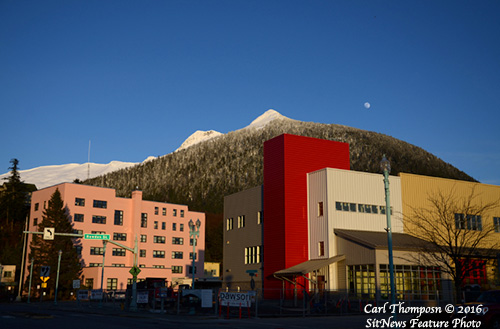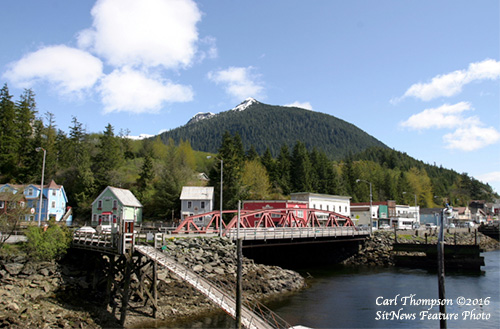
Debate over Deer Mountain Logging began more than 20 years agoBy DAVE KIFFER August 29, 2016
But the potential for Trust logging of the scenic area behind Ketchikan has been on the radar for more than 20 years when the Trust selected that land and other similarly controversial allotments throughout Southeast Alaska.
Ketchikan's Deer Mountain as viewed from downtown Ketchikan. In the foreground: the Federal Building and the City of Ketchikan Fire Department. The issue of mental illness in Alaska first became prominent during the years after the Klondike Gold Rush. Amongst the public there was a stereotype of the solitary gold miner sitting alone in his cabin all winter eventually going "stir crazy." But in many cases, as the new century dawned, it wasn't a stereotype. The rapid influx of thousands of people into the barely governed territory did boost the need for all social services and unfortunately, there now were more people in Alaska that needed mental health services and the territory was unable to provide those services. Federal law, at the time, allowed for people charged with crimes to plead innocent by reason of insanity, but what happened to them then was unclear if they needed treatment. In 1899, a criminal code change extended the need to provide services to Alaska, where previously only people who had become mentally ill during confinement were eligible for mental health treatment. The new Alaskan code also provided for people to be committed to an outside asylum if they were judged a threat to public safety but not found guilty of a crime. Within a couple of years, Alaska had a contract with the Mount Tabor Nervous Sanitarium in Portland Oregon, which was eventually renamed Morningside Hospital. For the next 50 years, Morningside would be the place where Alaskan sent its mentally ill. (See "Group hopes for information on Alaskans sent to Morningside; Portland mental health facility housed 3,500 Alaskans prior to statehood " - SITNEWS, Feb. 11, 2016.) Over the years, several attempts were made to establish a mental illness facility in Alaska. In the 1930s and early 1940s, Alaska's territorial delegate to Washington, Anthony Dimond proposed a sanitarium in Alaska. In 1944, his replacement E.L. "Bob" Bartlett continued those efforts. But the efforts generally came to naught as the more powerful delegation from Oregon fought any plans to remove the lucrative contract from Morningside. There was also a faction in Congress that opposed Alaskan statehood and felt that establishing more governmental structure in the Last Frontier would encourage the statehood efforts. Interestingly enough, national Republican leaders were generally opposed to Alaskan statehood because Alaska's population was perceived as more likely to support Democrats at the time. When Alaska was finally admitted in 1959, Hawaii was also brought in for political "balance." Hawaii in the 1950s was a Republican leaning state.
Deer Mountain as viewed from Ketchikan's Thomas Basin. It wasn't until the mid 1950s, when the Alaska statehood drums reached their highest intensity, that Bartlett found an unusual ally in his efforts to establish a mental health facility in Alaska. U.S. Representative Edith Green of Oregon, concerned about reports of financial improprieties - including the use of inmates for manual labor - at Morningside, began an investigation into the facility. She also openly supported Bartlett's proposals for an Alaskan facility. Morningside survived the audit and continued to hold the mental health contract, but Congress did approve, in 1956, the Alaska Mental Health Enabling Act which called for Alaskans to be returned home for mental health services if Alaska became a state, as it did in 1959. The Act also created the Alaska Mental Health Trust. From the beginning, the plan was to provide the Trust with enough land that could be developed and the funds from that development used to fund mental health services in the new state. The state agreed to set aside one million acres of land for Trust purposes. That's where the story gets foggy. The Legislature was tasked with managing those million acres. Unfortunately, through a variety of actions, most of the Trust's land did not go to its intended purpose. By the early 1980s, nearly two thirds of the "Trust" land was no longer under state control. Much of it had been allotted to local governments, state agencies, Alaska Native Corporations, and members of the public. With only 35 percent of the land still available to be developed to provide services, there were proposals in the Legislature to eliminate the land trust altogether and fund mental health services out the state budget instead. In 1982, Vern Weiss of Nenana filed a lawsuit against the state because his son required certain mental health services that were not available instate. Other plaintiffs joined what became a class action suit. Weiss won and the Alaska Supreme Court, in 1984, ordered the state to restore the original land trust. Since half of the land was now in other hands and had already been developed, the state negotiated with the Lands Trust for a decade before finally agreeing to supplement the remaining 500,000 acres with an additional 500,000 acres and a payment of $200 million. In the mid 1990s, the Trust began selecting its replacement acres and that's where the controversy arose, at least for residents in several Southeast communites including Ketchikan, Juneau, Sitka, Wrangell, Petersburg and Meyers Chuck. The Trust says that the parcels it chose near those communities were chosen solely for their financial value, while the community residents - who generally oppose development on those parcels - claim the Trust intentionally chose high value recreational and view shed lands that could be "ransomed" for other more high value timber land in the Tongass National Forest. After it selected the new land, including 900 acres of land on the face on Deer Mountain, directly above downtown, Ketchikan, the Land Trust said it was willing to look at land swaps for federal land more suitable for timber harvests. In 2005, it began negotiating with the United State Forest Service and eventually came up with a trade of 18,000 acres it had received in Southeast for a similar value of federal land on Prince of Wales Island and elsewhere. But then, as the USFS went through its internal process to assess the swap, every thing slowed down again. In 2015 the Land Trust announced that in the wake of the lack of progress on the swap it was looking at planning timber sales, initially on Deer Mountain and above the Mitkof Highway near Petersburg. In May of 2016, Alaska Senator Lisa Murkowski introduced a bill in the US Senate to facilitate the trade. In late of August of 2016, the Lands Trust then voted to go ahead with the timber harvest unless Congress approves the land exchange by, Jan. 15, 2017.
On the Web:
Contact Dave at dave@sitnews.us Dave Kiffer ©2016
Publish A Letter in SitNews Read Letters/Opinions
|
||

